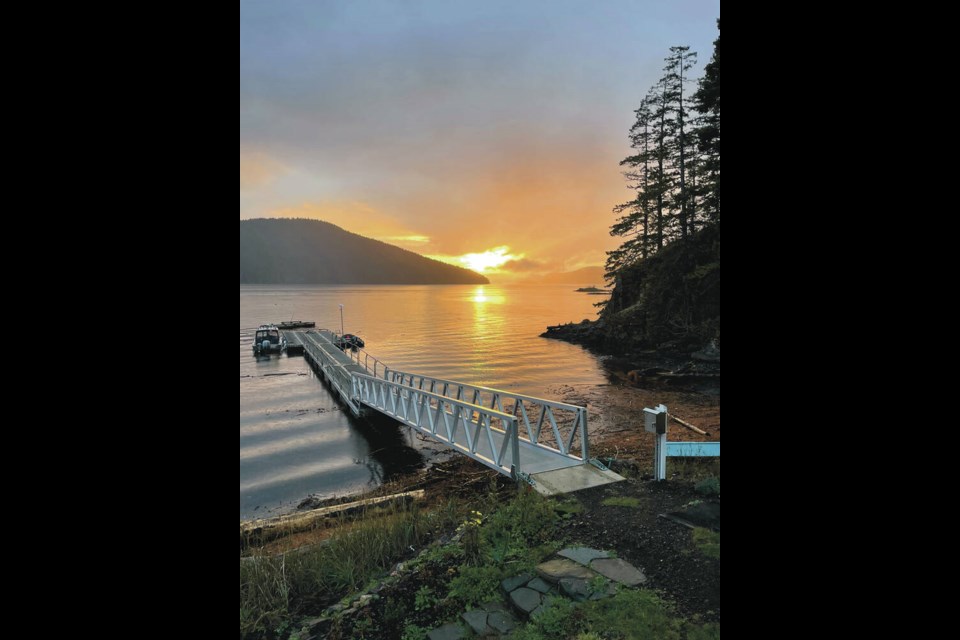When CNN aired Rosa Parks’ Detroit funeral in 2005, with Aretha Franklin singing and Bill Clinton praising the U.S. civil rights legend, few knew the artwork in the background was created in a tiny, isolated Vancouver Island hamlet.
Rev. Jesse Jackson, delivering the eulogy, even plucked a Martin Luther King quote from the memorial display designed by Lars Justinen, way up in Quatsino.
In fact, Lars and Kim Justinen run three separate digital businesses from their north Island cottage, including one billed as the world’s largest licensing source for religious-themed art, the kind commonly found on church publications. The internet meant Kim and Victoria-raised Lars, both illustrators, could live wherever they wanted. They chose Quatsino.
Which just goes to show that working remotely, really remotely, isn’t really that new. Nor is the idea that — shocking as this might be in Victoria, a city with a history of falling in love whenever it looks in the mirror — not everyone is fighting to move to the capital.
This comes up now because, as the TC’s Cindy Harnett reported Saturday, the B.C. public service is expanding remote-work opportunities. Not only is the government more fully embracing working from home, but as of April 1 its job postings will be open to applicants living anywhere in the province where the ministry doing the hiring has an office.
That’s not great news for Victoria merchants and restaurateurs. Having seen cash registers grow cobwebs when the pandemic emptied government offices, they have spent 2 1/2 years urging the province to prod employees back to their downtown buildings. Now, instead, we’re being told that those jobs need not be located in the capital at all.
As hurtful as this might be to the local economy, it’s also a blow to the municipal ego, as it runs counter to our deeply held belief that anyone given a choice of where to put down roots would opt for the City of Gardens. If technology frees you to work in whatever community you want, why not pick the place where February daffodils outnumber block heater cords?
Even in a country as blessed as Canada, Victoria stands out. A perennial favourite in the tourist-town rankings, we have also at various times been declared the smartest city in Canada, the top city for young professionals, the most romantic city and, last year, the city with the best night life (!) in the entire Great White North.
A decade ago, one U.S. academic went so far as to argue that Victoria’s high house prices were proof that we had the best quality of life in Canada, as we were willing to pay more for our “sustainable way of living.” Yup, that’s what we think of when selling our kidneys to make the rent/mortgage payment: this sure is sustainable. Ha, ha, those poor people in Quesnel and Castlegar with their new shoes and colour televisions, sucks to be them.
Except now the province is actually dangling as an inducement the idea that a government job need not involve coming to the capital.
If, to us, that sounds like being promised that you can drive a Lada instead of a Lambo, apparently it also reflects the new reality. The move to teletoil, this work-from-home-or-Hornby flexibility, is the product of the pandemic, advances in communications and a labour shortage that leaves employees with the upper hand. In December, 15.8 per cent of Canadian workers did their jobs exclusively from home. Another 9.6 per cent had a hybrid arrangement.
That shift, or at least the part that lets people chase a surprising variety of careers in far-off places like Quatsino (in case you’re still searching on the map, the community is 20 minutes from Coal Harbour by fast boat, then another 20 minutes by car to downtown Port Hardy) is no surprise to Lars Justinen.
“I always felt this was inevitable,” he says. “I knew the day would come when average jobs could be done anywhere.”
Increasingly, technology makes that so. Say what you will about Elon Musk, but the arrival of his Starlink satellite system means the Justinens’ connectivity is as speedy as anything on Douglas Street. That’s a game changer for anyone eyeing a place like Quatsino.
So are the house prices. The Justinens’ waterfront cottage is assessed at $220,000. They could, he says, fly to Victoria twice a week to do their shopping and still be way ahead financially. Real estate in their up-Island Eden, population 75, has actually nudged up lately, the result of a pandemic push similar to the one that sent city dwellers in search of post-9/11 tranquillity 20 years ago. (No word on whether Quatsino has a Missing Middle Initiative.)
Put it all together, and working remotely is no longer a remote concept.
>>> To comment on this article, write a letter to the editor: [email protected]


.png;w=120;h=80;mode=crop)

